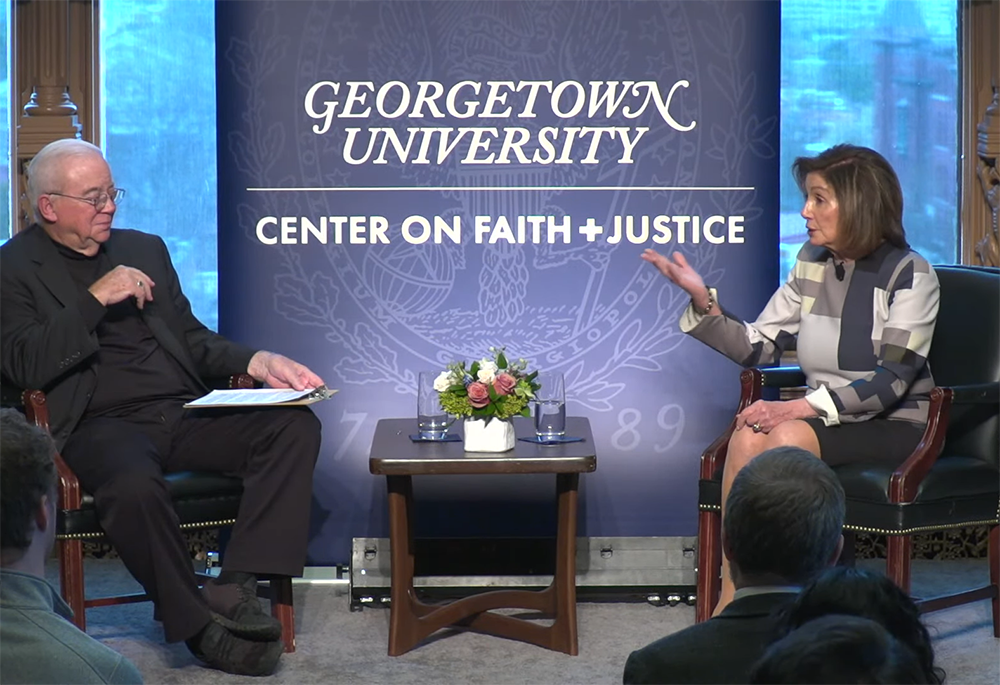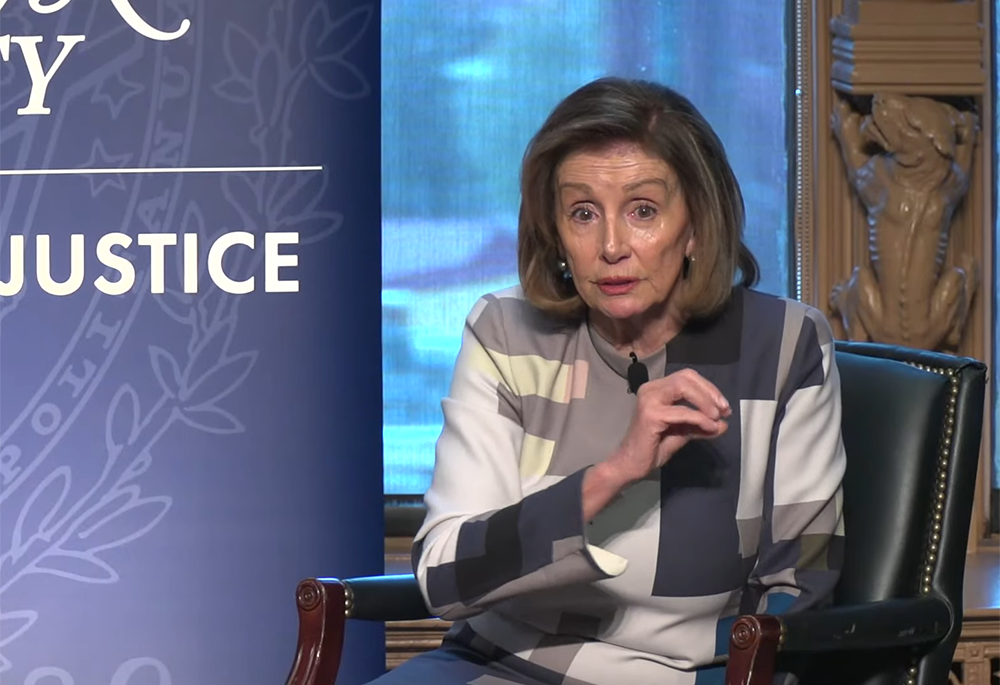
Former U.S. House Speaker Nancy Pelosi speaks to the Rev. Jim Wallis, director of the Georgetown University Center on Faith and Justice, March 23 at Georgetown University in Washington, as part of an inaugural conversation in the new series Higher Calling, where political leaders and public servants will speak about the role of faith and ethics in their lives. (NCR screenshot)
Former U.S. House Speaker Nancy Pelosi told students at Georgetown University on March 23 that, growing up, she was more attracted to being a priest than being a Catholic sister because of the priest's ability to celebrate Mass.
"Turning bread and wine into the body and blood of Christ, that is real power," she said.
"Maybe one day women will be able to do that as well," Pelosi said, expressing hope that Pope Francis would act on women's ordination.
Pelosi spoke to Rev. Jim Wallis, director of the Georgetown University Center on Faith and Justice, as part of an inaugural conversation in a new series named Higher Calling, where political leaders and public servants will speak about the role of faith and ethics in their lives. She also answered several questions from Georgetown students in the audience.
San Francisco Archbishop Salvatore J. Cordileone speaks from the floor during the fall general assembly of the U.S. Conference of Catholic Bishops in Baltimore Nov. 11, 2019. (CNS/Bob Roller)
Wallis and a Georgetown student both asked Pelosi about how she dealt with disagreements with U.S. bishops. In May 2022, San Francisco Archbishop Salvatore Cordileone declared that Pelosi could not receive Communion in that archdiocese until she publicly renounced her support for legalized abortion and went to confession. (Pelosi has continued to receive Communion in Washington.)
Pelosi said that her parents, and especially her mother, taught her about free will. "God has given us a free will, and we have a moral responsibility to live up to that," she said.
Of Cordileone and abortion, Pelosi said, "I figure that's his problem, not mine, because I had five children in six years and one week," she said.
Pelosi said that the U.S. Catholic bishops "are willing to abandon the bulk of [Catholic social teaching] because of one thing," in a reference to abortion. She highlighted concern over abortion as preventing the U.S. bishops from supporting the 2010 passage of the Affordable Care Act, also known as Obamacare.
"Thank God for the nuns because they offset the bishops," Pelosi said, in a reference to how groups such as the Leadership Conference of Women Religious and the Catholic Health Association supported the measure.
Pelosi also criticized Cordileone's role in the 2008 passage of Proposition 8, a California ballot measure banning the recognition of same-sex marriages that technically remains in that state's constitution even after the U.S. Supreme Court required states to recognize same-sex marriages in its landmark 2015 case Obergefell v. Hodges.

Former U.S. House Speaker Nancy Pelosi speaks March 23 at Georgetown University (NCR screenshot)
"He's made it very clear, maybe we're not all God's children. Maybe we do not have a free will," Pelosi said of the San Francisco archbishop.
Pelosi said she mentioned HIV/AIDS in her very first speech on the floor of the House of Representatives in the 1980s. On the topic of defending LGBTQ+ rights, Pelosi said, "it's my joy."
"All God's children, they have their own dignity and worth, their own individuality, their own authenticity, and that's a beautiful thing for us to embrace," Pelosi said.
She recounted conversations she said she has recently had with families of transgender children who fear not being able to meet the needs of their children because of new state laws limiting access to health care for trans individuals.
"I also see kids on the streets of San Francisco who are there because their families disowned them," Pelosi said.
Advertisement
When asked about her Catholic education, Pelosi referenced her March 15 commentary for National Catholic Reporter celebrating Pope Francis' 10th anniversary, in which she stated that between herself, her husband and their children and grandchildren her family has "more than 150 years of Catholic school education among us."
When a Chinese international student at the Georgetown event asked Pelosi about how her faith influenced her decision to go to Taiwan last August despite reservations from the Biden Administration, Pelosi said, "I've been fighting the Chinese for decades on human rights," referencing her positions of support for Tibet, Taiwan, Hong Kong and the Uyghur ethnic minority group.
Pelosi also said she has had a "little disagreement" with Francis over his efforts to negotiate with the Chinese government to normalize the status of the country's Catholic Church.
The Vatican entered into a bilateral agreement with the Chinese in 2018. While the details of the agreement have not been made public, it is understood to allow government input into the selection of Catholic bishops in the country. A number of observers have criticized the deal as being too deferential to the Chinese government.
"I don't think they've gained anything from it," Pelosi said of Chinese Catholics' benefit from the agreement.
About the U.S., Pelosi spoke about the viciousness of the campaign process as a deterrent to women running for office. "They do attack the integrity and the compassion that women have," she said.
"If we could lower the role of money, increase the level of civility, we would have many more women," Pelosi said.
Pelosi said that child poverty and hunger in the U.S. has motivated her throughout her political career.
"You have to be prepared to take a punch. You have to be prepared to throw a punch, for the children. Always for the children," Pelosi said.





